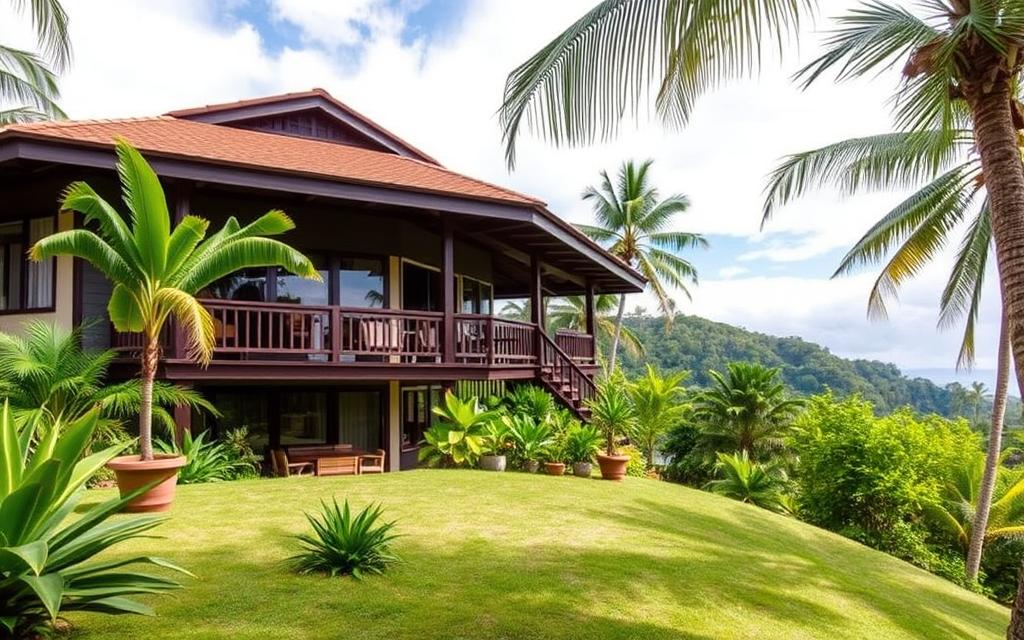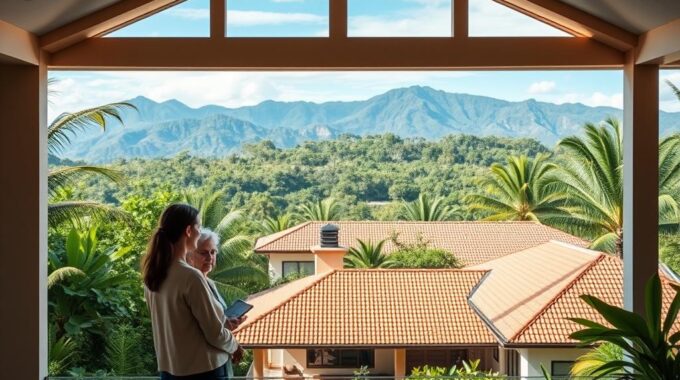Discover how to navigate understanding the approval process for GAP loans in Costa Rica. Our expert guidance ensures a smooth experience for securing investment property financing.

Maximize Your Home Equity in Costa Rica: A Guide
Did you know that Costa Rica’s real estate market is booming, yet financing a home can be challenging, especially for foreigners? With down payments ranging from 35-50% and interest rates as high as 20% for loans in colones, achieving your dream of owning a home in Costa Rica can be daunting.
We understand the hurdles. That’s why we’re here to guide you through leveraging your home’s equity to achieve your financial goals, whether it’s for renovations, investments, or other significant expenses. In Costa Rica, homeowners can tap into their property’s value using home equity loans, including flexible options like GAP Equity Loans.
Our comprehensive guide will walk you through the unique aspects of Costa Rica’s real estate market, how to assess your property’s value, and strategies for securing the right financing. We’ll also cover the potential risks and how to mitigate them, empowering you to make informed decisions about your investment property.
Understanding the Costa Rican Real Estate Market
Understanding the nuances of Costa Rica’s real estate market is crucial for making informed investment decisions. Costa Rica’s real estate market has something for everyone, from different budgets to various lifestyles.
Current Market Trends and Property Values
The market in Costa Rica is influenced by location and demand, with places like Guanacaste and the Central Valley being particularly popular. In city centers,property pricesrange from $500 to $1,300 per square meter. San Jose offers an 8.6% return on investment for luxury projects, while trendy spots like Santa Ana and Escazu offer about 7.5% return. Beachfront vacation rentals can earn 12% to 17% returns.
Unique Aspects of Costa Rican Property Ownership
The Costa Rican property market has unique characteristics, including legal frameworks and ownership structures that foreign investors must understand. Property values are influenced by factors like location, infrastructure development, and tourism trends.
Foreign Investment Considerations
Foreign investment has shaped the Costa Rican real estate landscape. Non-resident investors need to be aware of special considerations when entering this market. With tourism increases driving demand for both residential and investment properties, understanding the relationship between property location and potential return on investment is crucial.
What is Home Equity and How Does It Work in Costa Rica?
The concept of home equity in Costa Rica is multifaceted, involving both the property’s market value and outstanding mortgage balances. Home equity represents the difference between the current market value of a property and any outstanding mortgage or loan balances.
Defining Home Equity in the Costa Rican Context
In Costa Rica, home equity builds through two primary mechanisms: gradual loan repayment that reduces the principal balance and appreciation of property value over time due to market forces. This dual mechanism allows homeowners to accumulate wealth over time.
How Equity Builds Over Time
Understanding the timeline of equity building is crucial for property owners. Factors like location, property type, and market conditions can accelerate or slow equity accumulation. For instance, properties in areas with high demand or undergoing significant renovations may appreciate faster.
Differences Between Costa Rican and North American Equity Systems
The Costa Rican equity system differs from North American models in several key aspects, including how equity is calculated, accessed, and leveraged by property owners. Costa Rican homeowners have different options for accessing their equity, with distinct financial products and qualification requirements.
By understanding these nuances, homeowners in Costa Rica can better navigate the local real estate market and make informed decisions about their property equity.
How to Make the Most of Your Home Equity in Costa Rica
We help homeowners in Costa Rica navigate the process of maximizing their home equity through informed strategies. To achieve this, it’s crucial to understand the various factors that influence your property’s value and equity.
Assessing Your Property’s Current Value
Accurately determining your property’s current market value is the first step in leveraging your home equity. Working with qualified appraisers who are familiar with local market conditions can provide a precise valuation. Here are some key considerations:
- Comparable sales in your area
- Current market trends in Costa Rica
- Unique features of your property

Strategies to Increase Your Property’s Equity
Strategic property improvements can significantly boost your equity. Focus on renovations and upgrades that typically yield a high return on investment in the Costa Rican market, such as:
- Enhancing outdoor living spaces
- Modernizing kitchens and bathrooms
- Improving energy efficiency
Timing Considerations for Equity Extraction
Timing is critical when it comes to extracting equity from your Costa Rican property. Consider market cycles, interest rate trends, and your personal financial situation to determine the optimal time for equity extraction.
By understanding these factors and working with local real estate professionals, you can make informed decisions to maximize your home equity in Costa Rica.
Home Equity Loan Options in Costa Rica

When it comes to leveraging your home’s value in Costa Rica, understanding the available equity loan options is crucial. Homeowners can access significant funds with easier qualification, as their home serves as collateral. We connect borrowers with private investors and lenders, providing competitive rates and flexible financing options.
Traditional Bank Financing vs. Private Lenders
Traditional bank financing in Costa Rica typically requires a 35-50% down payment, with interest rates ranging from 7-10% for U.S. dollar loans. In contrast, private lenders may finance up to 70% of the property value at 8-16% interest, with loan terms up to 15 years. For more information on comparing loan interest rates, visit our guide.
Interest Rates and Term Comparisons
Interest rates for home equity loans vary significantly between institutions. Traditional banks offer rates between 7% and 10% for USD loans, while private lenders charge 8% to 16% but with more flexible terms. Loan terms range from 6 months to 15 years, with variations in repayment structures.
Collateral Requirements and Loan-to-Value Ratios
Understanding loan-to-value (LTV) ratios is crucial, as they typically range from 50-70% depending on the lender and property type. The property securing the loan is evaluated, and additional guarantees may be required.
GAP Equity Loans: A Flexible Financing Solution
In the realm of Costa Rican real estate, GAP Equity Loans stands out as a flexible financing solution. We connect borrowers with private investors and lenders, offering more adaptable financing options than traditional banking institutions.
Services and Loan Products Offered
GAP Equity Loans provides loan amounts ranging from $50,000 to $1,000,000, catering to various property types and investment goals. For more details on how we facilitate property loans, visit our explanatory page.
Loan Terms and Interest Rate Structure
Our interest rates start at 12% and vary based on loan-to-value (LTV) ratios and other risk factors. We offer flexible loan terms from 6 months to 3 years, allowing borrowers to choose repayment schedules that align with their financial goals.
Application Process and Timeline
The application process involves preparing required documentation, such as property titles and financial statements. Our streamlined process ensures efficient application processing.
Required Documentation
Borrowers need to provide property titles, identification, and financial statements.
Property Evaluation Process
We assess properties based on value, condition, and marketability to determine loan amounts.
For more information on GAP Equity Loans and to get started, you can contact us through our website, WhatsApp at +5064001-6413, or call our toll-free number for USA/Canada residents at 855-562-6427.
Step-by-Step Process to Secure a Home Equity Loan
The process of securing a home equity loan involves several key steps that we will outline in detail. To simplify this process, we will guide you through preparing your property and documentation, finding the right lender, navigating the application and approval process, and finally, closing the loan and receiving funds.
Preparing Your Property and Documentation
To begin, it’s essential to prepare your property for the loan application. This includes addressing any maintenance issues that could affect your property’s valuation. Gathering necessary documentation is also crucial. The required documents typically include property titles, tax records, identification documents, and financial statements.
- Property titles and deeds
- Recent tax records and payment receipts
- Identification documents (e.g., passport, driver’s license)
- Financial statements, including income verification and bank statements
Finding the Right Lender for Your Needs
Finding a suitable lender involves evaluating several factors, including interest rates, loan terms, and the lender’s experience with properties similar to yours. It’s also important to compare loan offers from different lenders, considering not just the interest rates but also fees and prepayment penalties.

Navigating the Application and Approval Process
The application process typically involves several stages, from pre-qualification to formal application. Understanding the approval criteria used by lenders can help you address potential concerns proactively, improving your chances of loan approval.
Closing the Loan and Receiving Funds
The closing process for home equity loans in Costa Rica involves specific legal procedures and documentation requirements. After approval, the timeline for receiving funds can range from a few days to several weeks, depending on the lender and the complexity of the transaction.
By working with experienced professionals, you can navigate potential challenges and streamline the experience of securing a home equity loan in Costa Rica.
Smart Ways to Use Your Home Equity in Costa Rica
Unlocking the potential of your home equity in Costa Rica can be a game-changer for homeowners looking to maximize their investment. With various financial goals and opportunities in the Costa Rican real estate market, homeowners can leverage their equity in multiple strategic ways.
Enhancing Property Value
One smart way to use home equity is through property improvements and renovations. By upgrading kitchens, enhancing outdoor living spaces, or implementing energy efficiency measures, homeowners can increase their property’s value beyond the cost of the improvements.
Investment Opportunities
Investing in additional Costa Rican real estate is another powerful strategy. Homeowners can use their equity to build a property portfolio, focusing on vacation rentals in tourist areas or long-term rentals in urban centers.

Debt Consolidation and Financial Planning
Home equity can also be used for debt consolidation, potentially lowering overall interest costs by replacing high-interest debts with a single, lower-interest equity loan. This strategy can simplify financial management and reduce monthly expenses.
Funding Retirement or Business Ventures
For expatriates and foreign investors, home equity can fund retirement living in Costa Rica or support business ventures in the country’s growing economy, particularly in tourism, sustainable agriculture, or technology services.
By evaluating the return on investment for different uses of home equity, homeowners can make informed decisions that align with their financial goals and take advantage of Costa Rica’s real estate opportunities.
Potential Risks and How to Mitigate Them
When leveraging home equity in Costa Rica, it’s crucial to be aware of the potential risks involved. The Costa Rican real estate market is dynamic, and several factors can impact property values and loan repayments.
Market Fluctuations and Property Value Considerations
Market fluctuations can significantly affect property values in Costa Rica. Regional economic factors, tourism trends, and other local conditions can influence the real estate market. Understanding these dynamics helps homeowners time their equity extraction to minimize risk.
Interest Rate Risks and Repayment Strategies
Interest rate risks are significant when using home equity, particularly with variable-rate loans. Strategies for managing these risks include choosing the right loan structure and planning repayments carefully.
Legal Considerations for Foreign Property Owners
Foreign property owners must be aware of specific legal considerations when leveraging equity in Costa Rican properties. Working with qualified legal advisors can help mitigate potential complications.
Protecting Your Investment Long-Term
Long-term protection of your investment involves strategic property management, regular maintenance, and staying informed about regulatory changes. By understanding the risks and taking proactive steps, homeowners can maximize their investment in Costa Rica.
Conclusion
Our journey through the world of Costa Rican home equity loans has highlighted the potential for significant financial flexibility. Home equity loans in Costa Rica offer property owners substantial opportunities, whether for property improvements, investment expansion, or achieving personal financial goals.
GAP Equity Loans stands out as a solution that bridges the gap between traditional banking limitations and the needs of property owners, offering competitive rates and terms tailored to individual circumstances. By understanding both the opportunities and risks, Costa Rican property owners can make informed decisions that protect their investments.
We encourage property owners to explore their home equity options by contacting GAP Equity Loans to discuss their specific needs and goals, leveraging their property’s value in Costa Rica’s evolving real estate market.
Article by Glenn Tellier (Founder of CRIE and Grupo Gap)



